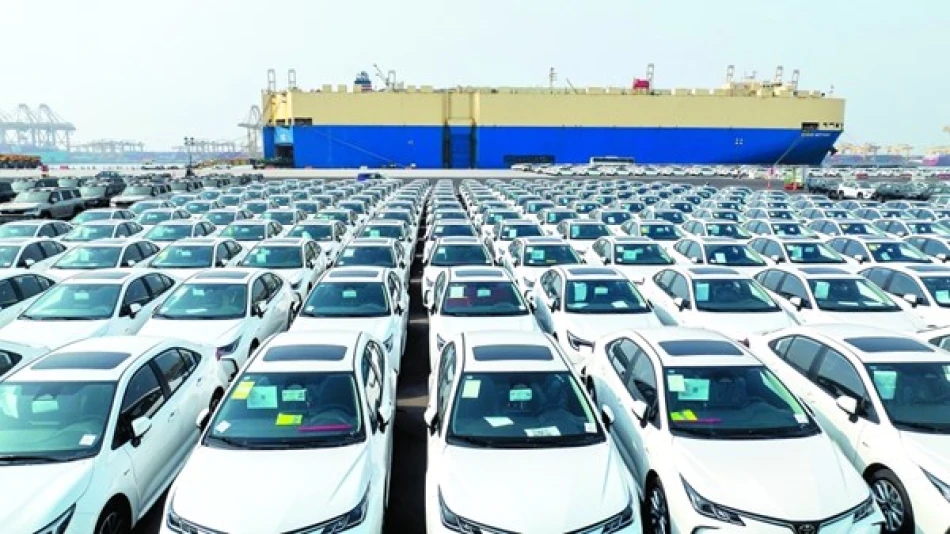
Jebel Ali Port Sees Impressive 28% Surge in Vehicle Handling During First Half of the Year
Dubai Builds World's Largest Auto Trading Hub as Vehicle Imports Surge 28%
DP World has unveiled a massive 2.6 million square foot expansion at Jebel Ali Port's Terminal 4, positioning Dubai to dominate global automotive trade as the region experiences unprecedented vehicle import growth. The expansion comes as the port handled 545,000 vehicles in the first half of 2025 alone—a 28% year-over-year surge that signals Dubai's emergence as the Middle East's undisputed automotive gateway.
Strategic Expansion Targets Growing Asian Auto Imports
The new facility increases Jebel Ali Port's total vehicle storage capacity to 75,000 units, with the expansion specifically designed to handle the flood of imports from Asia's manufacturing powerhouses. China, Japan, Thailand, India, and South Korea now account for 65% of all roll-on/roll-off cargo volume at the port, reflecting the region's growing appetite for Asian automotive brands.
The timing is strategic. As global supply chains reshape post-pandemic and Chinese automakers aggressively expand internationally, Dubai is positioning itself as the critical distribution hub between Asia and the lucrative Middle Eastern and African markets.
Infrastructure Built for Scale
The expansion features an 800-meter berth capable of simultaneously handling three roll-on/roll-off vessels—a significant upgrade that addresses current capacity constraints. By relocating vehicle operations from Container Terminal 1 to the dedicated Terminal 4 space, DP World expects to dramatically reduce turnaround times and improve berth availability during peak shipping periods.
This infrastructure investment reflects lessons learned from Singapore's Tuas Port and Rotterdam's automotive terminals, where dedicated vehicle-handling facilities have proven essential for maintaining competitive advantage in global trade.
Dubai's Billion-Dollar Bet on Automotive Dominance
The port expansion represents just the opening move in DP World's broader automotive strategy. The company plans to develop a 20 million square foot automotive marketplace in Dubai—potentially the world's largest vehicle trading hub when completed.
This ambitious project directly supports Dubai's D33 economic agenda, which aims to double the emirate's economy by 2033. The strategy mirrors successful models in other trade-focused economies: Singapore's automotive hub serves Southeast Asia, while Germany's Bremerhaven handles European vehicle distribution.
Market Implications for Global Auto Trade
For automotive manufacturers and logistics providers, Dubai's expansion offers compelling advantages. The emirate's strategic location provides manufacturers with efficient access to over 2 billion consumers across the Middle East, Africa, and South Asia—markets experiencing rapid motorization and rising disposable incomes.
Abdullah bin Dameetan, CEO of DP World GCC, emphasized that the expansion enables "faster and more reliable connectivity to key markets," a critical factor as automotive supply chains prioritize speed and reliability over pure cost optimization.
Regional Competition and Global Context
Dubai's automotive ambitions come as regional competitors intensify their own logistics investments. Saudi Arabia's NEOM project includes plans for advanced logistics facilities, while Qatar continues expanding its port capabilities ahead of sustained economic growth.
However, Dubai maintains significant first-mover advantages: established trade relationships, proven regulatory frameworks, and existing infrastructure that competitors will struggle to replicate quickly. The 28% growth in vehicle handling demonstrates market validation of Dubai's positioning strategy.
Investment and Trade Flow Analysis
The surge in Asian vehicle imports reflects broader economic trends. As Middle Eastern consumers increasingly favor Asian automotive brands—particularly in the electric vehicle segment—Dubai's infrastructure investments appear well-timed to capture this shifting trade flow.
For investors and trade finance providers, Dubai's automotive expansion represents a concrete bet on continued regional economic growth and evolving consumer preferences. The infrastructure investments also signal confidence in sustained trade volumes despite global economic uncertainties.
DP World's automotive expansion ultimately positions Dubai not just as a regional hub, but as a critical node in the global automotive supply chain—a strategic advantage that could prove invaluable as the industry navigates electrification, supply chain regionalization, and shifting consumer markets worldwide.
Most Viewed News

 Layla Al Mansoori
Layla Al Mansoori






